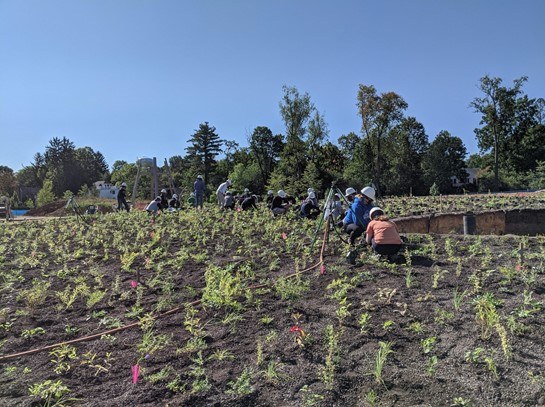Posted: January 28, 2021
CPR graduate student Makaylee Crone discusses the upcoming launch of the PSU Arboretum's Pollinator and Bird Garden in Spring 2021

Volunteers installing plants in Fall of 2020. Credit: Shari Edelson, The Arboretum at Penn State
Many people surround me, chatting excitedly, as we move slowly up the sandy hill, planting grasses and sedges as we go. This hill will serve as a nesting area for ground nesting bees, and carefully chosen plants will form a mat of roots to keep soil and tunnel-like nests in place. This is one of the many meticulously planned areas of the new Pollinator and Bird Garden, within the Arboretum at Penn State, that will make its debut to the public in Spring of 2021.
At more than 3 acres in size, this will be the largest garden in the world dedicated to creating habitat for these important species. Nearly 400 different plant species and cultivars have been integrated into the garden, and the design reflects a collaboration between Penn State scientists, including those at the Center for Pollinator Research, and landscape architects.
All 53,793 plants installed thus far have been the result of local volunteers. This is an impressive feat, with volunteers working a total of 1,053 service hours. Volunteers consisted of undergraduate and graduate students, faculty, staff, and community members. I consider myself lucky to have had the opportunity to help with such an important project.
Shari Edelson, Director of Operations at the Arboretum, said that “All of us at the Arboretum were amazed and humbled by the outpouring of community support, particularly because of all the challenges wrought by the pandemic. With both COVID-19 and construction safety protocols to mind, volunteers had to be outfitted with masks, gloves, AND hard hats while on site – and that's before we even handed out gardening tools!".
Community volunteer programs are a wonderful way to connect individuals that may not have met otherwise. I myself got to chat with faculty members I had not met before, along with community members that also volunteer at the botanic gardens every Tuesday and Thursday. Making these connections is particularly important now, as many people have felt isolated since the start of the COVID-19 pandemic. Community service projects can also help create a sense of well-being and unity, which strengthens our community as a whole. Those at the Center for Pollinator Research and the Arboretum look forward to a time when everyone can come together to enjoy the garden that was seeded for not only pollinator and bird conservation, but for community appreciation of nature.

